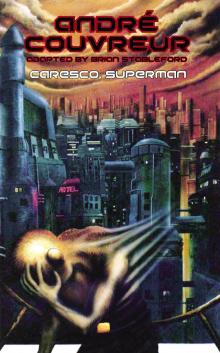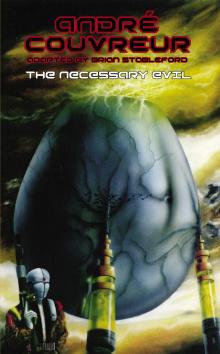- Home
- André Couvreur
The Exploits of Professor Tornada (Vol. 2) Page 18
The Exploits of Professor Tornada (Vol. 2) Read online
Page 18
Come on—what good does it do tormenting myself with these petty miseries, if I’m in the last cerebral spasms? Knowing whether or not one is dead, that’s what renders you philosophical, that’s what Socratizes you! Am I not a poet, a demigod, endowed with the faculty of creating cheerful sceneries in the sumptuous countries in which I am going to set foot?
And I create more of them; I participate in legends. I enter the Elysian Fields. Shades pass by. There’s Charon, the ferryman; here’s Orpheus, Orpheus in the Underworld, and the danse macabre. I float, I pivot, effortlessly. It’s very pleasant not to sense matter any longer. Why are humans so obstinate in living? Oh, if they could savor the nirvana of nothingness, the intoxication of the descent into the gulf, after the futile and fastidious climb…!
Mademoiselle is still praying. The candles are keeping vigil. The course of the candle…yes, I’m finishing mine... Ninette... Orpheus in the Underworld... Morpheus...
Nice rhyme! Remember that…if I ever wake up again...
I’m asleep...
Chapter VI
Whispering wakes me up.
The living have the advantage over the dead that instinct informs them approximately what time it is. When their eyes are closed, in a dark room, at least they can divine whether it is day or night. By observing that I could take account of the beginning of a morning I could conclude that I must, therefore, be alive. But from being uncertain as to whether it was only dawn or whether the light was already resplendent over our quarter of the globe, I could equally well conclude that I was dead.
What first caused me to suppose that the night had concluded was that, at the moment when I emerged from my torpor, I experienced the wellbeing, the cerebral lightness, that succeeds good sleep. But the conversation taking place at my bedside demonstrated to me even more clearly that I was inaugurating the first morning of my decease.
“Well, did the night go well? I’m not talking about that poor fellow; I’m reassured on his account—but what about you, my child?”
“I was praying, Professor. The hours are always peaceful when one is praying.”
“And what did you ask for, in your prayers?”
“That he be happy.”
“In other words, that he should be at home in the Kingdom of Heaven?”
“No, not that.”
“What, then?”
“That he should never know!”
“Well, personally, if I could invoke the Eternal Father, I’d demand the exact opposite.”
“That wouldn’t be charitable, Monsieur Tornada. He loves her.”
“Precisely. And Ninette?”
“I’ve been to see her several times during the night. The dear angel was sleeping peacefully.”
“You showed her Papa to her, last night?”
“Yes, Doctor.”
“What did she say?”
“She wanted to wake him up.”
“Poor microbe. And her mother?”
“Her mother?”
“Her stepmother, I meant to say.”
“I think she has slept well too.”
“With the result that you’ve spent the entire night here?”
“Oh, it’s no trouble, Doctor. I’ve lost a Master who has always been so good to me!”
“In what way has he been good?”
“In confiding Ninette to me.”
“You’re a pear, Mademoiselle Robin,”40 Tornada reflected…but his voice had softened. He added: “But that is a succulent fruit. It’s unnecessary, however, for poor Étienne to abuse it any longer. I need to meditate briefly in his company. Go rejoin Ninette, who must be awake by now. Tell her that there’s a doll for her in my auto.”
“Thank you, Doctor.”
Tornada waited for her to go away; then he carried out an examination exactly similar to the one he had carried out the day before, in his study, immediately after my collapse. He checked the persistence of my paralysis. He pricked me repeatedly with a pin. He took off one of my shoes and tickled the sole of my foot. I felt those touches very disagreeably, but I was incapable of reacting to them.
In fact, I experienced a joyful astonishment at his curiosity. He would not be searching for signs of life in a genuine corpse.
At the same time, he whispered to me through his beard: “Well, my antique, I’ve played a dirty trick on you, haven’t I? You should have grown some hair since yesterday, eh? Hair, fingernails, perhaps you believed that? You believed it of the brain, too? Ha ha! No, old chap, death only intervenes when nervous discontinuity occurs! And what were you thinking in your secret consciousness? Have you been cursing your old Tornada? Have you found a few fine nasty epithets for him, to propose to the Dictionnaire de l’Ac?41 But no, you’re good; you must have said to yourself: ‘If I’m not dead, that will give me pleasure; if I am dead; that will give pleasure to my friends—in sum, someone will be content either way.’ That’s you all over! Well, no, you’re not dead and you won’t die. You’re not in the lac and you will be in l’Ac. You’ll rhyme your adventure with cristi because l‘Ac rima cristi! Get it? It’s a pun.42 Do you think that I would deprive myself of seeing my old Étienne in a tailed coat embroidered in green, the color of hope and cadaveric decomposition? My old Étienne with a bicorn, to double the horns he wears already? And buckling on the épée…an épée…ha ha!...the blade of literature! Do you think that?”
He laughed noisily. As I have already said, I detested those absurd jokes about the illustrious company from which I was about to claim the most enviable feather in my cap—but this time, I welcomed them with the delight of a miner who, having been buried by a firedamp explosion, hears the resonance of the liberating pick.
Tornada pinched my nose, and continued: “Don’t try to respond. Your beak is blocked like everything else. You’ll talk later, when you’re in the Ac. You’ll even talk too much. But do you think that I’d waste my time, overworked as I am, stuffing you into your Sunday best, for the simple pleasure of delighting in your contemplation? That’s because you don’t know me, my old defunct. I had another idea. A marvelous idea, like all those woven on the loom of my meninges. I had the idea of opening your eyes by closing them, in order that tomorrow, you’ll fall at my feet, you hear, blessing me! For this is what I’ve done...”
He pulled up a chair sat down beside me, and lectured me.
“People have complained for a long time, since Adam scoffed the apple with our mother Eve, of not living long enough, and wishing that the human machine didn’t wear out so quickly. That obviously results from the fear of tomorrow. It also comes from the fact that religions stuff our heads with a heap of stories, all as crazy as one another. Human egotism is scared of the regulation of the petty infamies we commit down here.
“So, I said to myself—you know how much I love my neighbor—I said to myself: ‘Come on, Tornada, there’s only you who can find, not the elixir of youth—it would by idiotic if there were nothing but youth in the world; young women would have no more reason to cheat on old husbands like you, and vice versa—but something akin to an elixir of long life…Methuselah juice, if you prefer.
“Once I get an idea by the tail, as you know, they’d have to cut off my arm…so I searched. No…what I went through, in guinea-pigs, rabbits, rats, monkeys and, it won’t astonish you to learn, pigs, because they’re as similar to human anatomically as they are morally...I went through so many that it was necessary for me to buy a plot of land in Asnières to make a charnel-house for my lab meat. Let’s pass on. That’s a detail. After three years I hadn’t yet found my Methuselah juice.
“I was about to give up when, one day, I said to myself: ‘I’m an ass, damn it! I’m obstinately trying to prolong the functioning of worn-out carcasses when it would be much simple just to suspend them. Yes, quite simply stop life, as one stops an automobile engine, to start it up again later, fa-cul-ta-tively!’ It doesn’t seem like much, that idea, but it was a stroke of genius. I’m not bragging. It opened eternity to me.
> “So I started slaving away again. I bought more guinea-pigs, rabbits, apes and pigs. I bought a second plot in Asnières. No more blood, take note—not a drop! Although I’m a surgeon, I have a horror of blood; I consume as little as possible. No blood, but alembics, crucibles, test-tubes, preparations, formulae and injections. The most injected isn’t the one you might think. And I ended up by finding it. Now, you see, I can stop life just as I can...”
He completed his thought by blowing on one of my candles, which went out. Then he took a lighter from his pocket, struck it, and immediately revived the flame. Through the screen of my eyelids my retinas had registered that suppression, and the subsequent reappearance of the light, perfectly.
“…and I can reilluminate it. My breath is my 222; my lighter is my 444. You see how simple it is!”
He pushed back his chair. His voice, sometimes reaching me from one side of the room, sometimes from the other, indicated to me that he was speaking while marching back and forth on the thick-piled carpet. His excitement was increasing.
“Did I say that I stop? No, that’s not exact. I don’t stop; nor do I suspend. I…how shall I put it? I hold it back…I slow it down. One measure, pause, two measures, ten measures…but the piece continues. Each injection is a measure and I can inject ad aeternum. For, what is it that maintains life? It’s aeration, the oxygenation of the nourishing blood. It’s also a heap of phenomena that I won’t explain to you, because I’m talking to a poet. Biologists, moreover, don’t know much more than poets.
“I’m the only one who knows. I’m the only one who’s done the work. So store away blindly what I’m telling you—or don’t store it away; it’s all the same to me. The fact remains, nevertheless, that you’re in the power of my 222. I didn’t choose that figure; it was chance that it was my two hundred and twenty-second formula. But what a symbol! 222: the three cocottes!43
“You see, there aren’t only cocottes that one is smitten with. The others, the matrimonial, the legitimate, are no good. While my three cocottes, that’s a beautiful physiological adventure! I’ll sum up. With my 222 in your tank, your engine still goes, but it goes very slowly. It permits you one cardiac beat every five minutes, and that provides the oxygen necessary for life. You have no need to breathe, to take nourishment, since my product provides you with the pittance of organic exchange in full.
“Who will suspect that your heart is only beating every five minutes? You’ll see the official medical examiner when he comes. He’ll say: ‘What a fine corpse!’ and he’ll sign your passport to the grave, without suspecting that he’s expediting a sort of mummy, who retains his intellect and sensibility in full! Poor quack, I’m playing a nasty joke on him too! When I’ve reanimated you with my 444, the antidote to 222, they’ll be after the donkey’s blood, they’ll have the law on him…unless they come after me!
“But I can get myself out of it. I’ll say to my judges: ‘Come on, Messieurs, who among you wouldn’t be delighted by the idea of being suspended for a few years? Ten or twenty if you like—my syringe is at your service! One is comfortable in a coffin; it gives one time to think, to appreciate the value of events! One doesn’t cost one’s family anything... When one wakes up, one might find that the Boches haven’t paid the reparations and that the Soviets have become a consortium of Jewish capitalists! One can be younger than one’s great-grandchildren! One can see the descendants of one’s race! One can enjoy the comforts, the inventions of tomorrow; one can be illuminated by radium, warmed by stored sunlight; one can nourish oneself on compressed chemicals, travel on ultra-violet radiation; employ artificial fertilization in incubators for the spawn...no more forceps, no more love stories, no more dramas of adultery: the entire future program of science! Isn’t that nice?’
“And I’ll bet my last sou that I’ll be acquitted, and that in three days, I’ll be giving my judges, and the public, 222. Yes, my antique, it’s a sure thing! It’s so certain that I’ve drawn up plans for a vast dormitorium, with temporary crypts for each of my clients, where they’ll be quite tranquil in little quilted niches. Damn! Perhaps they’ll recognize one day that I’m an ace—a super-ace! I’ve often wondered who will be the man of the twentieth century, the man of nineteenth having been Pasteur, because Victor Hugo, a poet...
“Well, in my humble opinion, the man of the twentieth century will be me. I’ll have my statues! Yes, the century of Tornada, that has a pleasant ring to it, don’t you think?”
He was getting excited. “Do you know what else I’m working on? A new motor-fuel. I use animal fat to make an explosive gas! It’s human fat that gives the best result. Finally, we’ll no longer be dependent on foreigners; the deficit will go down; all automobiles will run on Tornada carburant. It’ll be sufficient to de-grease all corpses—and even the living, if the dead are in short supply. Can you imagine mining the bellies of fat old women? ‘You’re overweight, Duchesse? Come on, get moving! To the degreaser. It’s high time that you gave traction to the proletariat, or took your drive in the Bois under your own steam! Thanks to your breakdown, my plump chicken, people will no longer have to worry about breaking down by running out of gas! Ha ha!”
He writhed. But I rediscovered, in his words, his perpetual cerebral gestation. How many times had he subjected me to his insane projects, in which I was obliged to recognize nevertheless, cheek by jowl with the extravagance, a certain logic, and even a certain practical reasoning. It was quite possible that he could have realized that adipose motor-fuel. At any rate, I was relieved to know that his 222 was not simply a demented dream.
But why had he made me one of his first victims? Yes, why me?
As if he had divined my question, he went on: “I hope you’re no longer wondering what inspired me to inject you with my 222. You must already have worked that out. Nevertheless, as I want you to be completely edified, I’ll leave you in this state until tomorrow morning. That will permit you to savor human instincts in all their beauty. You’ll be able to make a novel of it later, with this conclusion, which I’ll dictate to you in advance: that amour is agreeable when it commences, but is much more agreeable when it ends. Now that you know on what tomb you’re dancing, I’ll leave you. See you later, old hysteroptome…that’s the ancient designation for a man who comes back after having passed through death.”44
He took a few steps toward the door, then abruptly retraced his steps. “I forgot. Fashion dictates that cadavers should have their eyes closed, but for you, we’ll make an exception. And I pronounce, in imitation of the creator: Fiat lux… for your poule de luxe.”45
So saying, he opened a slight gap in my eyelids, after having massaged them to free them momentarily from their contracture. In that fashion, I was able to perceive through my eyelashes everything that was happening within the visual radius of my immobile eyes. In truth, nothing reached me but a pale funereal radiance. Even worse, it illuminated the sarcastic and bushy face of my cruel experimenter.
And yet, what a celestial gift! I could see! I could see!
Tornada soon moved aside, and was succeeded on my retina by a full length portrait of Lucienne, which I had hung opposite my bed, in order that it would provide the joy of my awakening and would also accompany my dreams of her tender suggestion.
Tornada pointed a piercing finger at the portrait. “Well, are you content? You have your angel in your peepers!”
The angel and the demon too, I would have replied. The angel and the demon, engaged, before me, in a merciless contest. Alas, contrary to all the pious images that had filled my childhood with wonders, it testified to the fact that it was the demon who was about to cast down the angel. Everything that I had been able to observe since I had had been dead to my entourage announced the victory of the former and the defeat of the latter, with no possible redress. There was still an unknown, which was about to administer the coup de grâce to the angel. I had a presentiment of that in the sentence pronounced by Mademoiselle Robin: “That he should never know.” A woman had therefore be
en clever enough for this macabre comedy to be necessary, in order that her simpleton of a husband should find her out. There existed, therefore, a lyricism of lies so forceful that the lies of lyricism were nothing by comparison!
No, it wasn’t possible! I couldn’t have been that blind! Lucienne couldn’t have that whorish soul! Her innocence would shine through! I still wanted to believe that...
But the hour that followed dealt me one of those blows that tell in the life of a dead man.
Shortly after Tornada’s departure, Mademoiselle Robin returned to my bedside. Being able to examine her now, I was surprised by the ravages she had undergone. Her features were ordinarily bathed in a sadness that I attributed to the persistent mourning for her fiancé. Ninette sometimes lit them up with gleams of happiness, which then rendered her veritably desirable, but her dominant note was melancholy. Well, at present, no trace any longer remained of her beauty. One might have thought that she had withered away in a single night. Her complexion was livid, her eyes revealed the burn of tears.
She stood there for a good ten minutes looking at me, almost as petrified as I was. Only her hands were trembling. She pulled herself together abruptly, however, when the door opened to let Lucienne in.
The contrast between the two women, then, was a revelation to me. As much as the one was humble and consumed, the other was arrogant and flourishing, in her pink peignoir, her elegant lace night-cap, under which she had not neglected to place, near her ears, two curls of false hair that advertised her Venetian tresses.
“I’ve come to take your place, Mademoiselle; it’s time you got some rest.”
“I’m not tired, Madame.”
“Don’t overtax your strength, Madame—all the more so as I might have need of you tonight. My headache hasn’t stopped for a second! It seemed to me that my head was about to burst.”
“You’ve been so upset,” the governess appreciated, with a discreet irony that I was the only one to notice. But she did not budge.

 Caresco, Superman
Caresco, Superman The Exploits of Professor Tornada (Vol. 2)
The Exploits of Professor Tornada (Vol. 2) The Necessary Evil
The Necessary Evil The Exploits of Professor Tornada (Vol. 3)
The Exploits of Professor Tornada (Vol. 3)